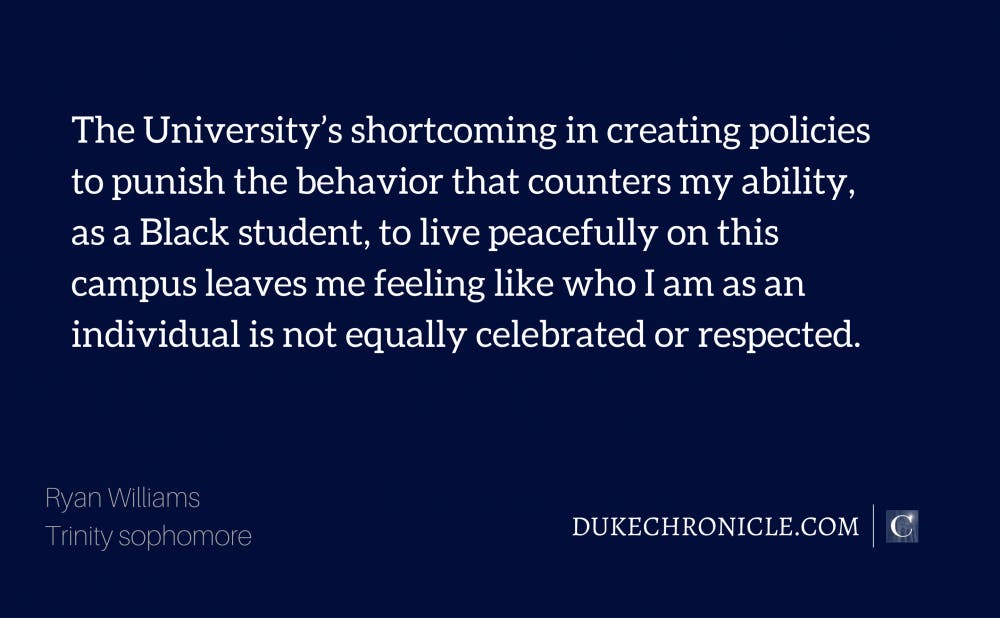There is a difference in noticing that you are not like everyone around you and feeling like those differences ostracize you. Noticing my own Blackness comes when I recognize how little Black people there are in the social circles I find myself in. Whether it be my social group, my major, my extracurricular clubs and activities, or my work-study job, I am constantly noting the disproportionately low number of familiar faces in a concentrated environment. These moments, however, are not what concerns me about Duke’s commitment to Black students.
Coming from a suburb of Texas, I’m more or less used to be the only Black face in a classroom, church auditorium or Friday night football game. In a sense, noticing my Blackness and the way it changes the atmosphere is normal. It’s only when I got to Duke—a school that promised me the world upon entry—and realized that my peers could be both openly racist and receive little more than a slap on the wrist for acting upon those view that I began to feel my Blackness constrict my ability to thrive.
Granted, some of this is due to my own naivete. I often forget that before Duke was the gothic wonderland that it is today, it was Trinity College; a college funded by men who were openly racist. Even after the University moved cities and established itself as Duke University, its doors were closed to African American students for nearly 25 years. It wasn’t until 1963 that African American students were permitted to enroll as undergraduates.
Since then, the University has shifted toward tolerating Black students. With every passing year, it seems as if upper administration is placing a bandage over the racial wounds that we, as a campus, fail to reconcile with. In some cases, these bandages work to make Duke a better place for Black students—a place that welcomes more into the school, provides a space for them to congregate and get to know each other. But, until upper administration prioritizes accommodating, not just tolerating, the needs of Black students, my Blackness will continue to be felt.
The University’s shortcoming in creating policies to punish the behavior that counters my ability, as a Black student, to live peacefully on this campus leaves me feeling like who I am as an individual is not equally celebrated or respected.
In the year that I have been at Duke, there have been four highly publicized incidents of racial animus against Black students. In each of these incidents, the word “n****r” was thrown around as if Duke were a plantation, and all Black students only received strongly worded emails promising that upper administration does not share in the ever more common “cowardly and hateful” views behind these actions.
To Duke administration: I would only hope that you, as figureheads of one of the world’s leading research institutions, do not harbor the kind of insensitivity and ignorance that would endorse open and explicit racism. But, after a certain point, there is nothing left to say in defense of the cyclical trend of racial incident, strongly worded email, inaction.
After the incident at the Mary Lou on Sunday, I had to take a step back and analyze why these events keep happening. After thinking over the four incidents that have taken place while I have been a student (and the countless others that transpired before I arrived on campus) I have realized that the reason why Black students have to console each other more and more frequently is because the University fails to put policies in place that both identify and punish open racists. I don’t think the logic is hard to follow: if there is a racial incident on campus then there must have been a racist on campus. If there was a racist on campus, the best course of action to remove said racist should be to cultivate a campus climate that does not make racists feel comfortable performing racism.
Black students and student activists alike are only asking for the University to do two things. Punish hate speech and make Duke welcome to all. If minority students have to bear the work in making this campus more diverse, the least we deserve in compensation is to be respected.
Get The Chronicle straight to your inbox
Sign up for our weekly newsletter. Cancel at any time.

